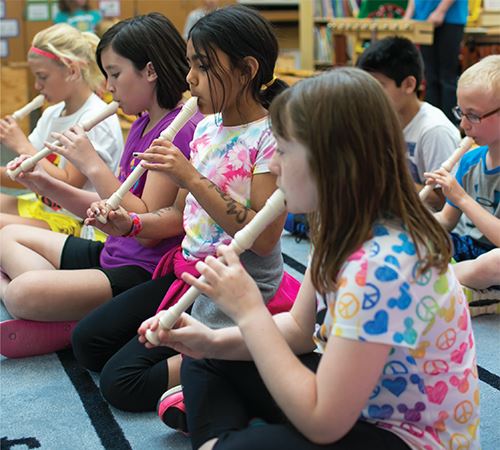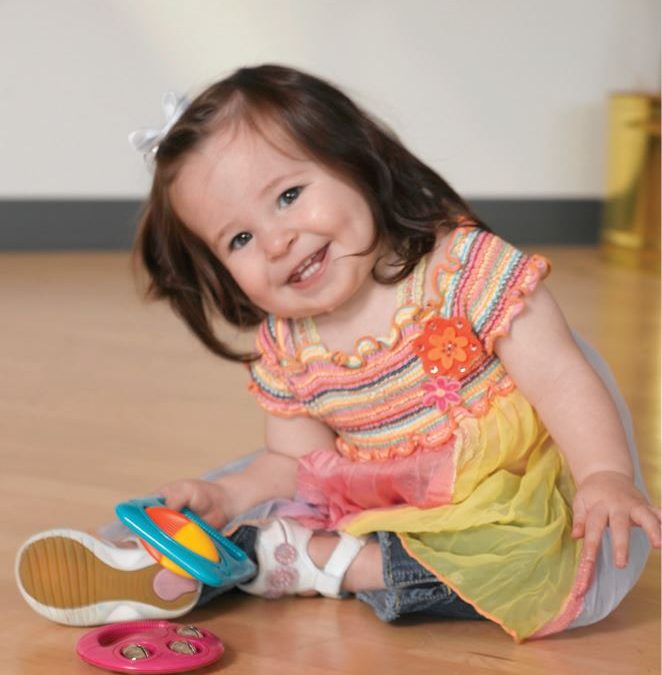While hearing music is enjoyable in its own right, the benefits of taking part in it highly outweigh those of just listening. Musical education during childhood can positively impact cognitive development, improve social skills, and increase academic achievement. And you don’t have to wait until your child is older — music education has been shown to have positive effects on babies and toddlers!
West Music’s History of Supporting Music Education
Since opening our doors in 1941, West Music has strongly supported music education. In fact, our founder Pearl West taught in the music department at Iowa City High School. Today we work directly with thousands of school music programs across the county and support many more with charitable donations through our membership with NAMM (The National Association of Music Merchants). In our stores, we offer Early Childhood Education for children as young as three-months. Supporting music education is an integral part of our mission to “Play now. Play for life.”
Music and the Brain
Being exposed to music throughout childhood has profound impacts on the development of the growing brain. A 2016 study at the University of Southern California’s Brain and Creativity Institute found that musical experiences during these crucial years accelerates brain development, especially in the areas of reading skills and language acquisition. It has also been found that learning how to play an instrument can improve mathematical intelligence and even boost academic achievement.
Music Education Benefits for Infants (birth to age 1)
Recent research has found that babies benefit from music education long before they can even walk or talk. One study found that one-year-olds who participated in interactive music classes with their parents smiled more, communicated better, and showed more sophisticated brain responses to music.
An excellent way to incorporate music and movement with infants is through soft and colorful scarves. You can manipulate these in the air while singing soft lullabies and nursery rhymes. They are also great for sensory play, so be sure to let your infant feel the softness of the scarf on their hands and feet. While your baby might want to hold onto them forever, please note that movement props are not toys’ they are to be used under adult supervision.
Music and Movement for Toddlers (ages 1-3)
One of the biggest benefits of having toddlers engage with music is in language development. Recent studies have found that musical training can wire the circuits of the brain in different ways. This development is specifically seen in parts of the left side of the brain, which contributes to processing language.
The key to music with toddlers is repetition. Children at this age crave consistency and routine, which is why they love reading the same books and listening to the same songs over and over. Repeating songs together promotes memorization and helps them to predict what comes next. Sound Exploration Books are a perfect fit for this age!
Toddlers also love being able to move and dance to the beat, so encourage them to explore with using instruments. Instruments specifically designed for small hands, such as toddler shaker instruments, are the perfect way to introduce them to creating and playing music.
Early Childhood Music Education for Preschoolers
Researchers in the field of brain development are quick to point out that the brain of a musician is wired differently than that of a non-musician, even a very young one. Preschoolers who were involved in making music showed larger brain growth in neural activity, so, simply put, being a musician makes your brain work harder.
Preschoolers love to sing and let their voices be heard. They enjoy nursery rhymes about familiar things, and they like songs that have repeating words and melodies. Plays using puppets are great fun for this age, and learning rhymes together is the perfect musical actives for preschoolers and their parents!

Music Learning for School-Aged Children
A study published in 2007 at the University of Kansas reported that students in schools with superior music programs scored approximately 22 percent higher in English and 20 percent higher in math on standardized tests. This reveals how music impacts many aspects of a child’s life and how vital it is to school performance.
Elementary school may be the first time some children really begin to have an interest in taking music lessons for a specific instrument. Many school music programs start with a musical recorder. Lightweight, simple, and capable of producing a charming sound, recorders are an ideal pre-band instrument to lead children into a lifetime of music-making.
Let Our Music Experts Help!
There are many things you can do as a parent to cultivate and grow a passion for music in your child, no matter their age. Remember, it’s never too early, or too late, to enjoy the benefits of music! Shop online or contact West Music at 800-397-3978 for suggestions and assistance.




